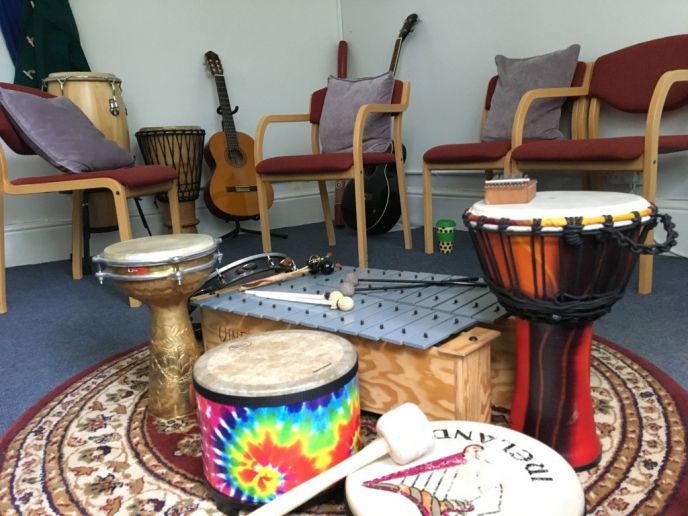Category menu

Music and Tourettes
Posted on 24 June 2020 by Pippa McClounan
A summary of a study into the role of music in the lives of those diagnosed with Tourette Syndrome by Lizz Lipscombe, Music Therapist: Bmus, MA, MA
It has been shown that tics significantly decrease, if not disappear, when a person with Tourettes is engaged in music performance . A personal account from the rhythm man described the rollercoaster ride of Tourettes being transformed when playing jazz on a drum kit, a place where he rode ‘it’ rather than it riding him . This personified separation of the ‘it’ and ‘self’ for a person with Tourettes, was a central theme within my own findings. I strove not to investigate the tics of ‘it’, but to investigate the inner personal experience of the ‘self’. I interviewed and explored music improvisation with six adults diagnosed with Tourettes. Each participant had their own personal relationship with music and a unique relationship to their own Tourettes.
Findings
Part listening to a particular genre of music through one ear of headphones, or as background from the radio, aided focused attention at work. Listening to specific music could match an emotional state and aided self-regulation like falling asleep. Personal songs/pieces encouraged cathartic emotional release giving relief from Tourettic symptoms. Performance provided a space to forget Tourettes and be in public without ticcing. On stage, tics could be experienced as a positive focus, rather than negative judgment. Song writing gave a clear voice to the ‘self’, providing a place to feel in control. Composing music gave freedom for creativity and expression within appreciated boundaries of rules and structural form. When the whole self was engaged in singing, playing or dancing, participants were able to ‘let it out’ and Tourettes could be ‘lost’.
For some, free music improvisation provided a safe external space where perceived responsibilities were equally shared within co-created boundaries.
For other’s such improvisation was too unpredictable, but spontaneous call and response felt comfortable and tic free. When enjoying instrumental performance alone, Tourettes could be forgotten and tics disappeared. However, when thinking about the proficiency of their playing, Tourette’s re-appeared.
Suggestions based on findings
Music has pulse, flow, patterns and predictability, sharing distinct and potentially utilisable characteristics with obsessive habits (often concurrent with Tourettes). It may be that repetitive distressing pathological thoughts can be replaced by ‘earworms’ through intentional excessive listening to a song or riff. Tourette’s is considered ‘highly hereditary’ . Music could be played through the womb of a pregnant mother to imbue a safe space association to a song for later use. 1% of children have tics that usually appear around the age of six . Toddlers may benefit from a greater availability of safe musical spaces like drumming groups during crucial periods of physical, psychological and social development.
Music is an easily accessible, affordable, non-intrusive, flexible and enjoyable tool. The wider implications of this study are that bespoke music based interventions could be of great value to many individuals with Tourettes.
This paper will be presented at the British Association for Music Therapy (BAMT) 2021 conference and submitted for Journal publication in late 2020.
For further information or to make an enquiry, please contact lizz@lizzlipscombe.co.uk or visit her website www.music-therapist.com.
Bodeck, S., Lappe, C. & Evers, S. (2015) Tic-reducing effects of music in patients with tourette’s syndrome: Self-reported and objective analysis. Journal of the Neurological Sciences. 352(1–2), pp. 41–47.
Seligman, A.W. & Hilkevich, J.S. (1992) Don’t Think about Monkeys: Extraordinary Stories by People with Tourette Syndrome. Duarte CA: Hope Press.
Beaman, C. P. & Williams, T.I. (2010) Earworms (‘stuck song syndrome’): Towards
a natural history of intrusive thoughts. British Journal of Psychology. 101, pp. 637–653.
Keen-Kim, D. & Freimer, N. B. (2006) Genetics and Epidemiology of Tourette Syndrome. Journal of child neurology. 21(8), pp. 665-671.
Robertson, M.M. (2003) Diagnosing Tourette syndrome: is it a common disorder? Journal of Psychosomatic Research. 55(1), pp. 3-6.
Buckser, A. (2008) Before Your Very Eyes: Illness, Agency, and the Management of Tourette Syndrome. Medical Anthropology Quarterly. 22(2), pp. 167–192.
Sacks, O. (2008) Musicophilia: Tales of music and the brain. London: Picador


